Dear Healthy Jew,
Spring has sprung here in Israel. Trees are blossoming, flowers blooming, each annual herb and plant taking its turn to dominate the roadside. Many (but not all) of the contenders are edible and nutritious, some even medicinal.
Yellow mustard – the first harbinger of spring - has come and gone; now wild carrot rules from its high white throne. (Together with its poisonous cousins, so be careful!) Bristly hollyhock is just beginning to launch its dazzling purple rush skywards. Stinging nettle seeds (only the leaves sting, not the extremely nutritious seeds!) are almost ready to munch – for whoever reaches them before the herds of sheep that graze every spring and summer in the Jerusalem mountains and Judean lowlands.
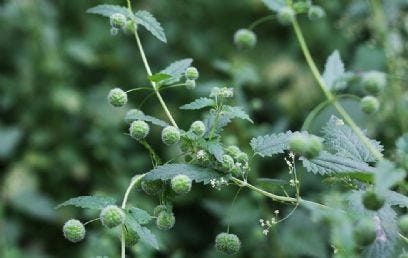
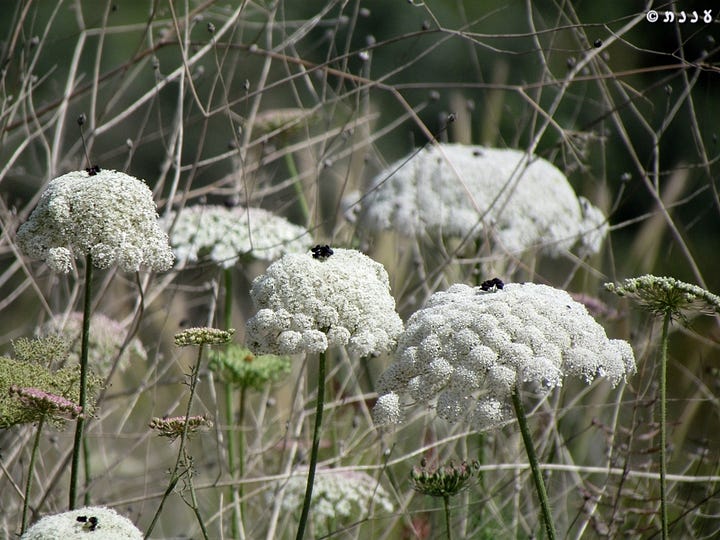
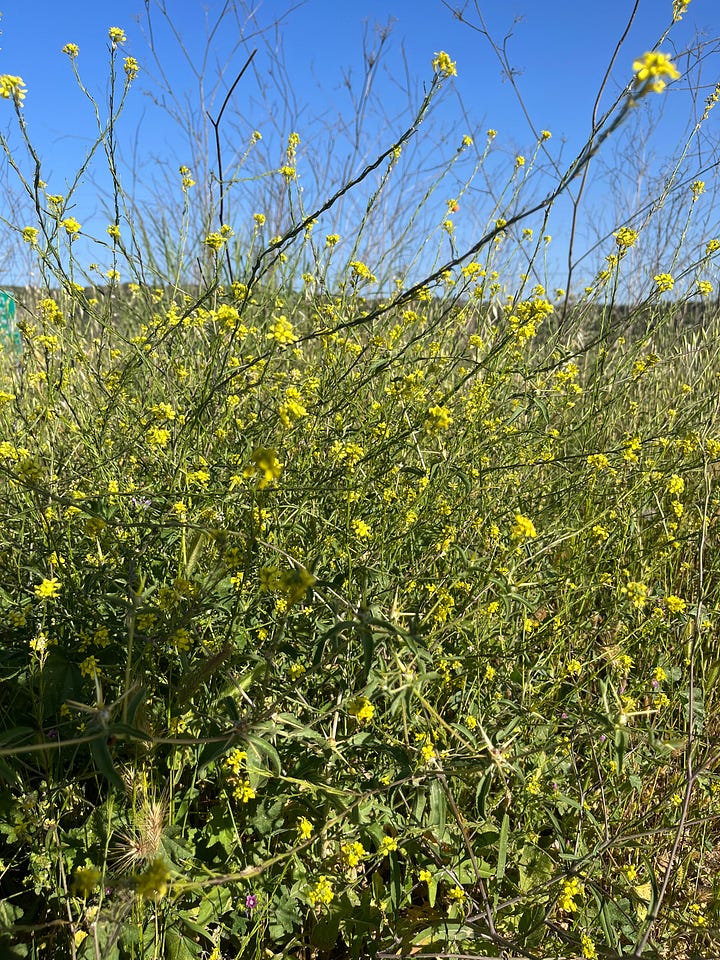
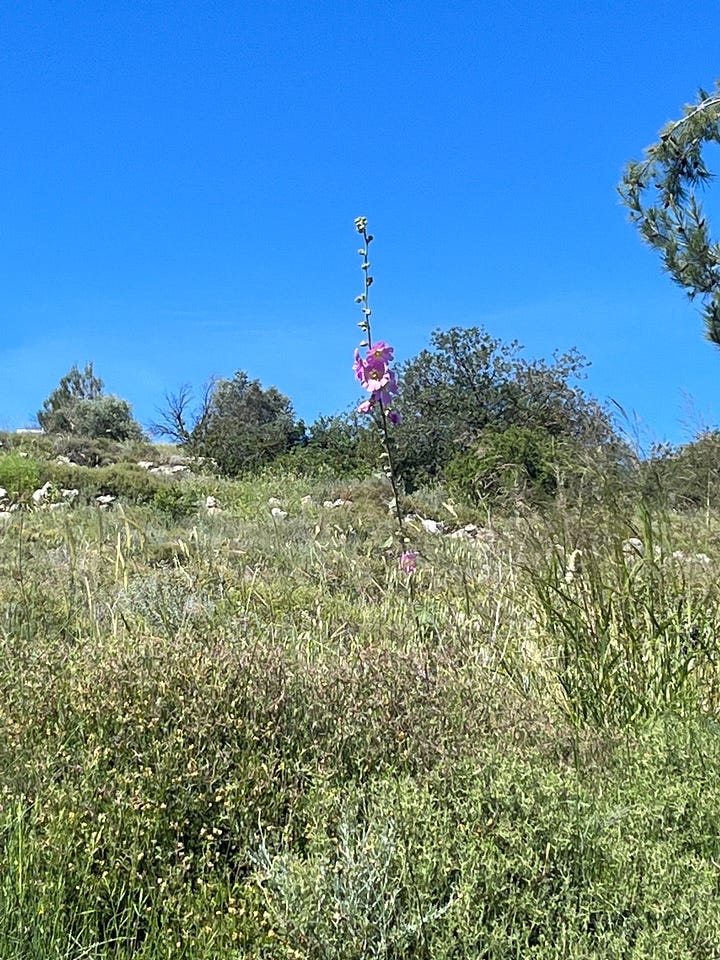
Drought
Yet all is not well; this past winter’s drought still haunts the land. Many species of plants are smaller and fewer. Some flowers have forgotten to open. Natural Israel is quieter this spring than in the past several rain-blessed years.
It’s a strange situation. The week before last was unseasonably rainy for mid-April. We had lots of fun playing in the local Yarmut stream which has been overflowing with rain at least since Joshua conquered its namesake city downstream over 3000 years ago.
But before that we had an unusually mild winter, with little rain except a single major storm way back in early February. Her name was Barbara.
In a land that for most of history watered all its crops, animals, and people from the winter rains, drought has never been a trivial matter.
Even today, in the age of desalination, when Israel’s people and their farm animals can magically drink seawater, everyone else continues to rely on rain. And it truth, we too still need bountiful rainfall, if not primarily literally, then at least metaphorically in the form of rain-style sustenance from heaven, as I explained in these pages at the height of the drought. Several weeks later, after the first big storm hit, I reflected on how individuals’ choices combine to comprise humanity’s choice that summons a heavenly response, for better or worse.
Yet you might be wondering, didn’t the rains eventually come, almost reaching the yearly average, and in some areas even surpassing it? So what if they came a bit late, bunched together in two bursts of wetness? Dear land, don’t complain. Drink your water; grow your plants and fruits.
Yet nature doesn’t work that way – not the land, not its plants and animals, and not its people.
Health Means Balance
Health, Maimonides1 and Luzzato2 explain, is defined as balance. Life isn’t a building or machine, constructed by banging together thousands of unrelated parts. Life is a dynamic interdependence of countless components and factors coming together in seamless synchrony. If one element is missing or overexpressed - or even off-schedule - the entire organism suffers.
All life processes function within a narrow range, what biology calls homeostasis. Diabetes means too much blood glucose, anemia too little iron. A weak immune system is vulnerable to infections, if too reactive is prone to autoimmune disease. This loss of balance is what we call sickness; healing comes when everyone returns to playing their roles in harmony.
The Land of Health
Israel provides a particularly poignant example of how health and sickness hinge on balance.
Rabbi Yehudah HaLevi (1075-1141) wrote in his classic work of Jewish thought, the Kuzari (1:95), that what makes Israel the Chosen Land is its balanced climate and central location. (Nachmanides made a similar comment to Leviticus 18:25.)
Israel isn’t extremely hot or cold, high or low, dry or wet, north or south, east or west. This tiny country contains geographical, meteorological, and biological elements of the three continents it straddles: Europe, Asia, and Africa. The Negev in the south is a desert; the peak of Mount Hermon in the north has snow all year. The middle parts receive adequate rain in the winter to carry through the dry summer. There are no violent hurricanes or tornadoes.
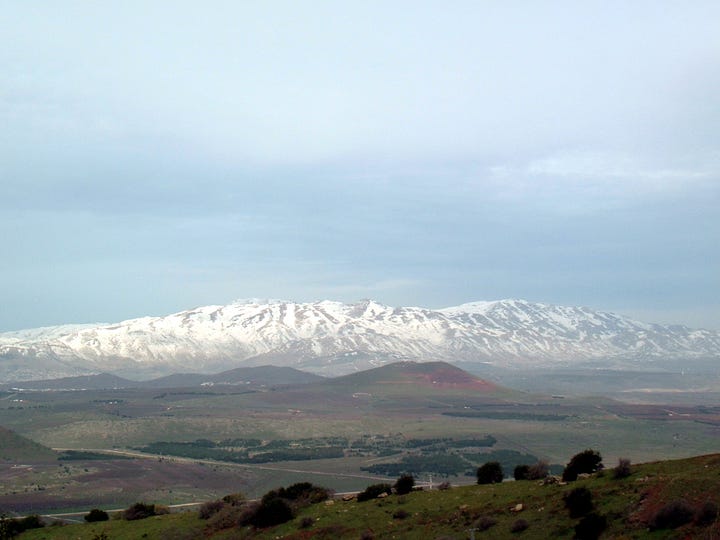
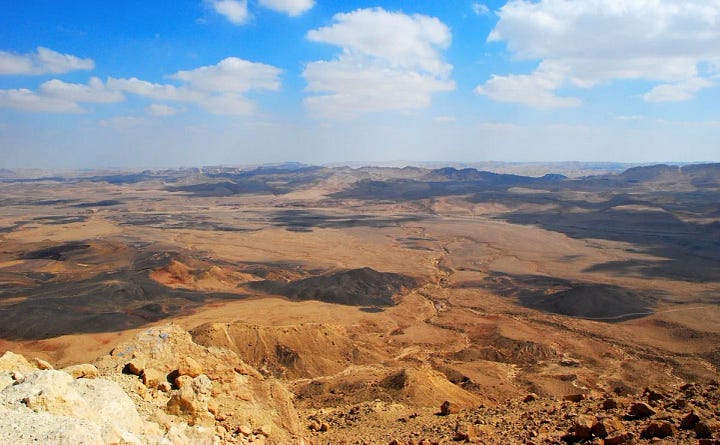
I lived for the better part of a decade in a windy northeastern Jerusalem neighborhood, and was privy every day to another, profoundly holistic, expression of Israel’s balance.
The Hebrew word for spirit, ruach, is the same as for wind and air. Not surprising, because we intuitively know that the spiritual realm rises above the physical, like air over the ground. God is up in heaven, not down in a cave, right?
This explains, it seems to me, the Talmudic teaching that the Temple is the highest place in the world: it’s not physically higher than Everest, nor even nearby Hermon, but is where human consciousness beholds God’s heavenly presence.
In the Land of Health, such an extreme expression of spiritual height must find balance on the other end of life’s spectrum. For that reason, I believe, if you follow Highway 1 east of spiritually high Jerusalem, the road plunges downward, and then down some more, stopping only upon reaching the lowest place on physical earth, the Dead Sea. Right above the beach you can drink a beer at The Lowest Bar in the World.
Israel bonds the highest spirituality together with the lowest physicality, revealing to the world the inner nature of health.
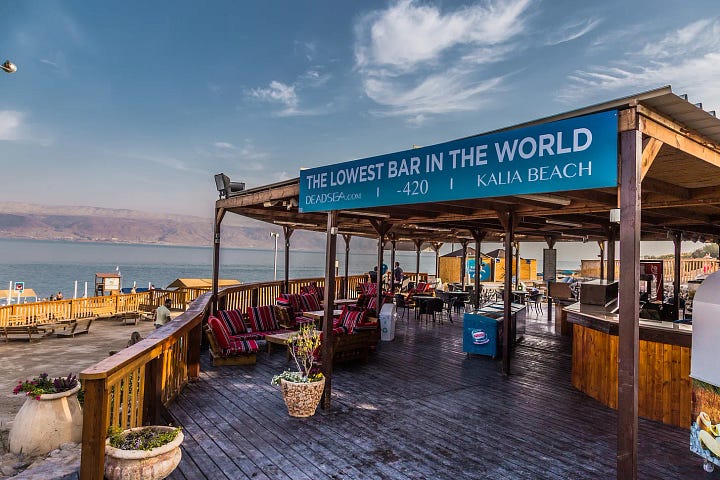
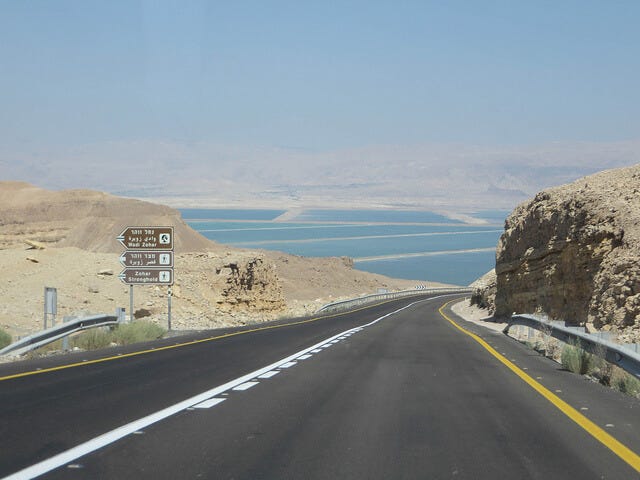
That is, when the rains come on time.
Here is the Torah’s first blessing for those who follow its ways faithfully (Leviticus 26:3):
I’ll give the rains in their time, and the land will give its harvest, and the trees of the orchard will give their fruits.
To which Nachmanides commented, alluding to how balanced rain introduces the rest of the passage’s blessings:
He began with the rains, because when they come on time, as is proper, the air will be pure and good, and the springs and rivers good. This will bring health for physical bodies, and all the fruits will be plentiful and blessed by them [the rains]. Then people won’t get sick, and they and their animals won’t miscarry or be barren. Their days will be full, because when bodies are large and healthy, they survive their whole lifespan. This is the greatest of the blessings.
What begins with rain falling in balance, teaches the Torah, culminates with long and healthy human lives. Every expression of life on earth is infinitely rich and complex, interconnected with the entire biosphere. Not for naught do congregations of Jews gather all over the world in the fall festival of Sukkot to pray for rain, and gather again in the spring festival of Passover to pray for dew instead of rain.
Israel Off Balance
But this year the rains didn’t come when prayed for. They bursted in months later, then abruptly left. They only returned in quantity after we already prayed for dew. Life rained down from heaven, but off-kilter, unbalanced, unhealthful.
So not only are we left with less of spring - the plants and flowers fewer and smaller – but spring is also unbalanced and chaotic, that is, unhealthy.
Walking and running along the country trails, I’m immersed in the confusion that’s befallen Natural Israel. One major casualty of the drought is my close plant friend, the milk thistle, a remarkable fellow whom I’ve shared about a lot in these pages and on social media. I’ve even taken to calling the knoll across the street Milk Thistle Hill, although I could have called it by half a dozen other plants, and could have given this name to hundreds of hills in the area.
In April, the thistle should be the height of a person, and sporting a large head of hairs - first purple, then white - that each grasp a seed. When they’re ready to meet the world, the hairs and seeds loosen, detach and blow away, landing in the place where next year’s thistles are destined to grow – unless my fellow foragers and I and catch them first. If we get them before they fly, we might munch them in the field, or maybe boil them for tea. Herbalists will prescribe their extracts for liver and digestive ailments.
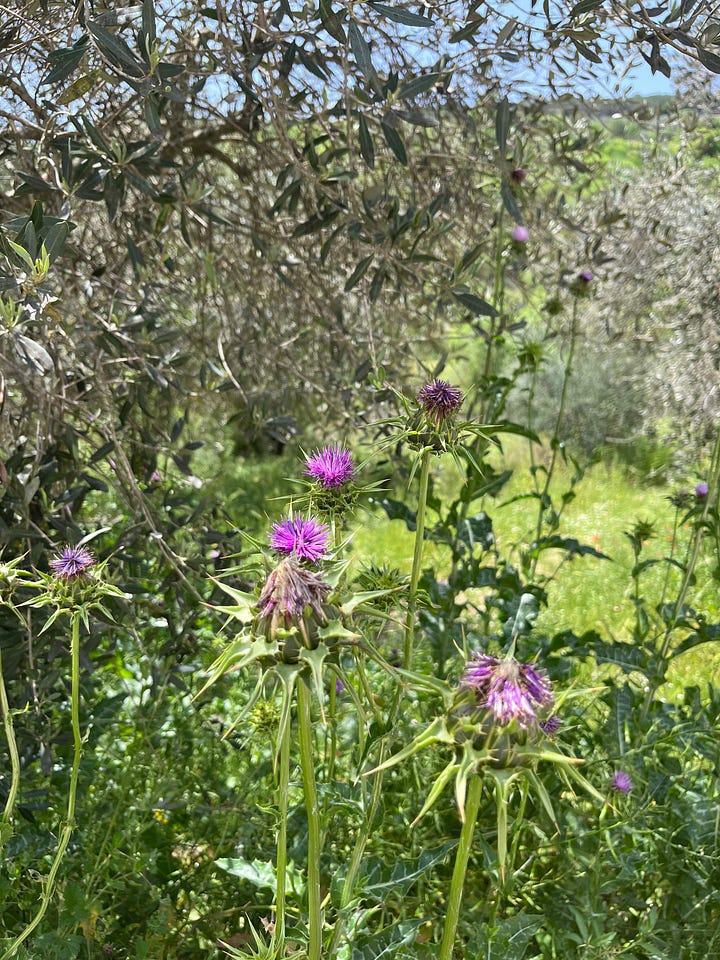
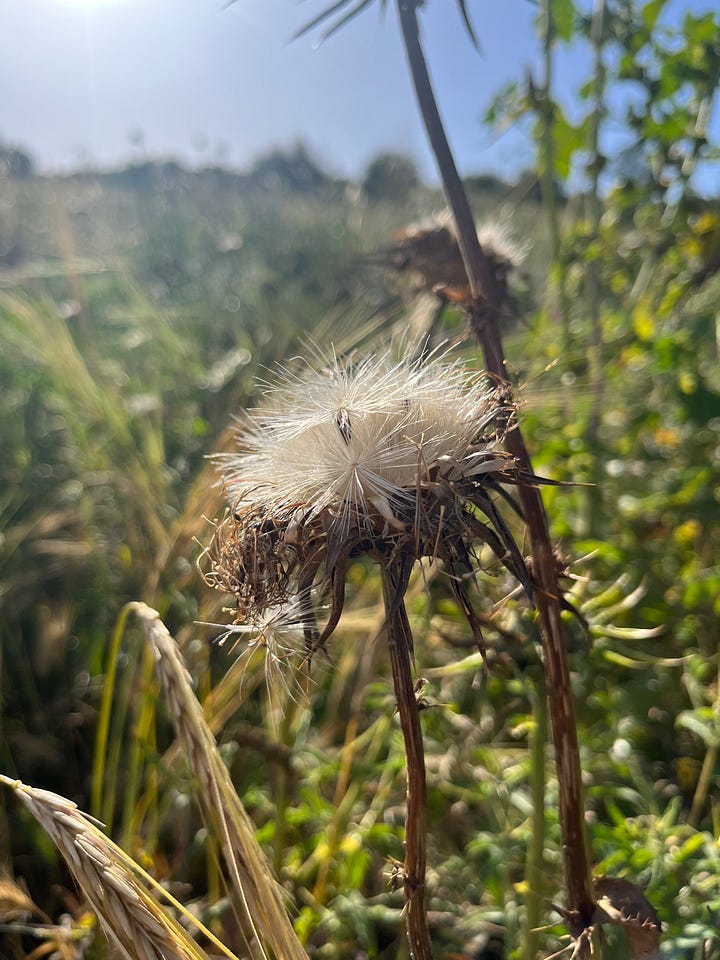
Is all this happening now? Yes. If not, the land would be, frankly speaking, dead. Thankfully, Israel is not dead, because the rains did fall, albeit off-schedule. Yet the land is sick, unbalanced.
Many thistles started growing too late in the season to reach their full height, so they are stunted and frail. Mere toddlers, the spring hormones pushed them into puberty along with everyone else; they vainly try to scatter their unripe seeds into the wind. Some will refuse, their heads shut tight in bewilderment. It’s heartbreaking.
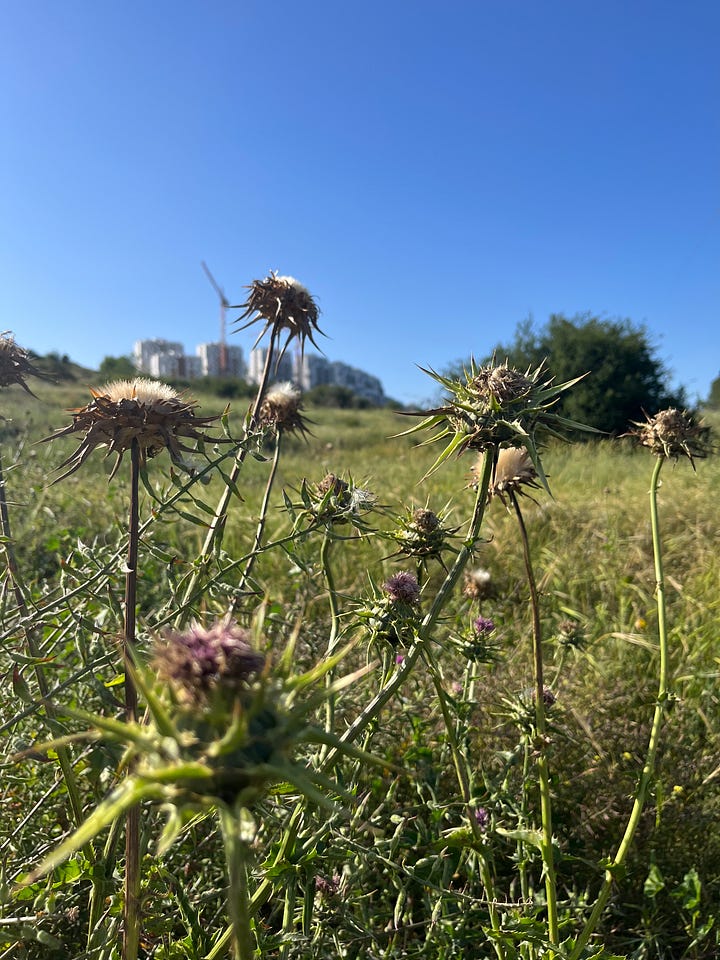
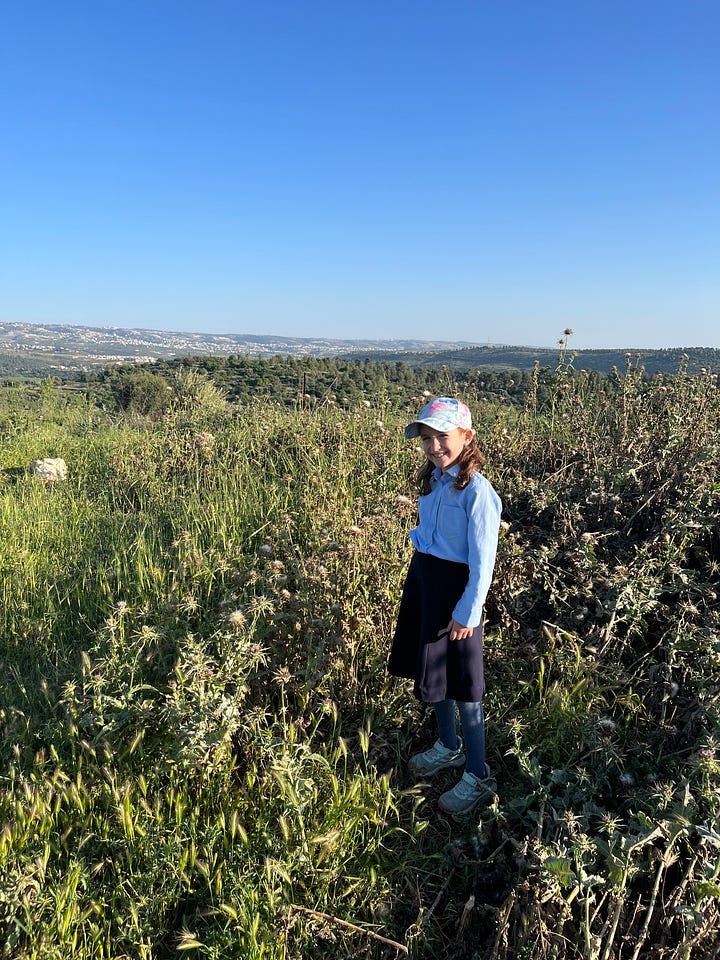
Yet all is not lost. Thousands of thistles have grown into adult thistlehood despite the adversities. They might be shorter than usual, and sport fewer seeds. But they march on through life, patiently awaiting next winter’s healing rains. Just today I took a group out foraging on Milk Thistle Hill; we had a blast chomping away on thistle and nettle seeds.
My Own Imbalances
As someone whose temperament gravitates to extremities, I too can hearken to the call of the milk thistle, the call of Natural Israel.
I tend to push myself in study and work beyond reasonable limits, forging on until burning out and needing to drop it all. I also struggle, in many areas, to receive the gifts of life in moderation. For example, eating too much healthy food is like receiving too much rain; it drowns life inside its own source. Perhaps most of all, I’m inclined to frantically control, or try to control, the course my life (and yours too, if I’m not careful). Although very much alive, I’m often imbalanced.
Finding health doesn’t require that I rest all day, suffer through fasts, or extinguish my wildly ambitious personality. That would just exchange one extreme for the other, getting me exactly nowhere.
Instead, awareness of my imbalances enables me to accept them, and then choose to try balancing actions. I can invest in relaxing, devoting time to taking care of myself. I can investigate ways of nourishing my body and spirit with restraint. And I can learn methods of letting go and allowing life to ably take its course, all by itself. I’m growing as a Healthy Jew, seeking the healthy balance that works for me.
One suggestion: In what area(s) of your life are you off balance, tending to one extreme or the other? How can you choose healthy balance?
Thank you for reading Healthy Jew.
Here are 2 great paths to continue the journey:
Also check out this intro and index to explore hundreds of posts about our 3 Healthy Jew topics: Wellness with Wisdom, Land of Life (Israel), and Sensible Spirituality.
Finally, always feel free to reach out here with any comments, questions, or complaints:
I look forward to hearing from you!
Be well,
Rabbi Shmuel Chaim Naiman
Please note: All content published on Healthy Jew is for informational and educational purposes only. Talk to a qualified professional before taking any action or substance that you read about here.
Guide 3:11. See also Laws of Character Traits 2:1 and Introduction to Avos Chapter 4 where Maimonides compares in detail physical health with character health - while explaining at length that character health is the balance between extremes.
See Da’as Tevunos 128-130






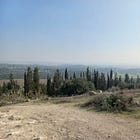



So, so true for many people today! Motivating! Perhaps step one is to stop...and breathe.Thank you!